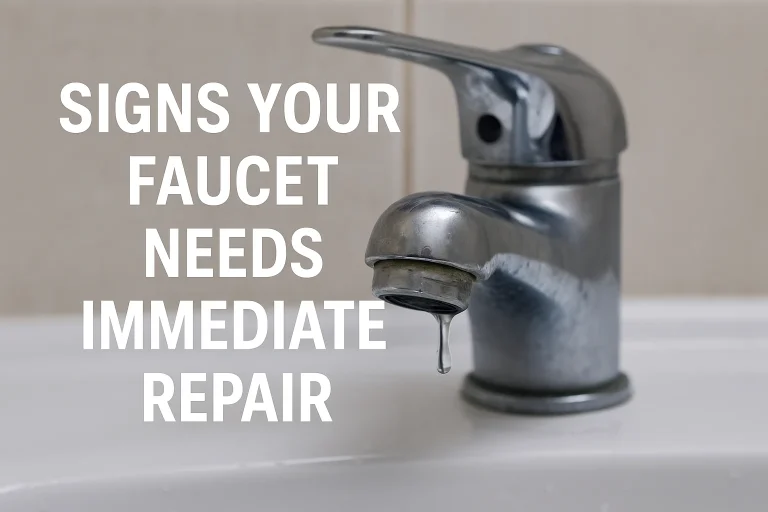Signs Your Faucet Needs Immediate Repair
When a faucet starts acting up, it’s not just a minor annoyance—it can be a warning sign of much bigger trouble. What begins as a slow drip or stiff handle can quickly turn into water-damaged cabinets, warped countertops, mold growth, or even structural issues behind the walls. All of this can spiral into expensive repairs if ignored for too long. If you’re noticing any of these issues, it’s best to speak with a trusted Houston specialist. You can get fast help from the Faucet Repair & Replacement in Houston team before damage worsens.
Let’s dive into the exact signs that indicate your faucet needs attention now—not later.

Warning Signs You Shouldn’t Ignore
Even small faucet issues are often early signals of hidden internal damage. Here are the top warning signs that should never be ignored.
Dripping After Shutoff
That rhythmic “plip…plip…plip” sound can seem harmless, but it signals internal valve failure or worn-out washers. A dripping faucet can waste more than 3,000 gallons of water per year—that’s like 180 showers! Worse, the constant moisture can lead to:
- Mold around the sink or wall
- Rotten wood in cabinets or vanities
- Higher utility bills each month
And yes, in Houston’s humid climate, mold thrives even faster in hidden spaces beneath your sink.
Low or Irregular Water Pressure
Does water sputter when you turn on the tap—or seem weaker than usual? This could indicate:
- Mineral scale buildup inside faucet aerators
- Partial clogs in the faucet valve or cartridge
- Corrosion of internal metal parts
Hard water is a common issue in many Houston neighborhoods, particularly in areas like Katy and Sugar Land, leading to faster mineral accumulation inside faucets. If left unchecked, low pressure can also signal deeper plumbing blockages or pipe issues that begin in the faucet itself.
Rust or White Mineral Buildup
Visible signs of rust or white, chalky buildup on the faucet surface or spout are more than cosmetic problems. These usually mean:
- Internal corrosion of metal components
- Hard water calcium deposits (common in Houston)
- Imminent valve or cartridge failure
Once corrosion begins inside a faucet, it can release flakes into the water supply and jam the internal mechanisms. This increases the risk of leaks and costly part replacements.
What causes faucet corrosion?
Faucet corrosion is usually triggered by long-term water exposure, oxygen, and mineral-rich hard water. In Houston, chlorine-treated water combined with mineral content creates the perfect storm for early corrosion, especially in cheaper metal faucets.
Faucet Handle Sticking or Grinding
If your faucet handle sticks, grinds, or won’t rotate smoothly, it could point to:
- Deteriorated O-rings or gaskets
- Rust inside the stem
- Mineral friction wearing down components
This small inconvenience often leads to major failures where the faucet won’t shut off properly or gets stuck halfway, resulting in leaks or water waste.
Squeaking or Hammering Sounds
Odd noises when operating the faucet—such as squeaking when turning or loud banging in the pipes (known as “water hammer”)—suggest:
- Loose washer screws or parts
- Sudden pressure surges through unstable components
- Pipe brackets becoming unfastened near the faucet assembly
These sounds are mechanical red flags. They indicate internal vibration or loose parts that can eventually rupture seals or cause sudden leaks.
Real Story from a Houston Homeowner
A homeowner in Sugar Land ignored a faint drip in their bathroom faucet for two weeks. At first, it seemed harmless—a few drops on the sink basin. But over time, water began seeping into the cabinet base. They noticed a musty odor, then soft wood beneath stored towels. When a plumber finally investigated, the damage included warped particleboard cabinetry and mold climbing up the drywall. The final cost? Over $1,200 in cleanup and cabinetry replacement—damage that could’ve been avoided with a $120 faucet repair.
What Happens If You Ignore a Faucet Problem?
It’s tempting to think, “It’s just a little drip,” or “I’ll deal with it next week.” But with faucet issues, every delay can multiply the cost and damage.
Here’s what commonly happens when faucet problems go ignored:
Drips Become Leaks:
What starts as a minor drip can quickly turn into a steady leak as seals and valves degrade.
Water Damage Spreads:
Moisture seeps into cabinets, drywall, and flooring, leading to swelling, soft spots, and eventually rot.
Mold Growth Begins:
Constant dampness creates an ideal environment for mold—especially dangerous in Houston’s already humid climate.
Structural Risk:
In long-term cases, wood frames beneath sinks or behind walls can weaken from water infiltration.
Utility Bills Rise:
Even one dripping faucet can increase your water bill by up to 10% monthly.
In short, waiting often turns a $100 fix into a $1,000 restoration job.
How Damage Can Spread to Cabinets, Walls, or Floors?
Faucet problems don’t stay isolated. Because sinks are mounted over porous wood or particleboard cabinetry, even small leaks can spread in damaging ways:
Cabinets:
Water soaks into the wood below, causing warping, bubbling, and eventual collapse of structural panels.
Drywall:
Leaks near wall-mounted faucets may penetrate drywall, requiring full replacement once mold sets in.
Floors:
Moisture that escapes under vanity units can seep into tile grout or laminate seams, leading to lifted flooring or mildew smells.
Especially in older Houston homes with wood cabinetry and less moisture-resistant materials, this type of damage can spread fast—and silently.
Can a dripping faucet really cause all this?
Yes. Over just two weeks, a continuous leak can introduce gallons of water to closed cabinet spaces. With no ventilation, trapped moisture can trigger hidden mold colonies and rot.
When to Call a Plumber Without Delay?
If you notice any of these signs, you shouldn’t wait:
- Water dripping after shutoff for more than 24 hours
- Faucet handle is jammed, squeaky, or loose
- Water pressure has suddenly dropped or pulses
- Any visible rust, corrosion, or white buildup
- Moisture, stains, or soft spots beneath the sink
Even if you’re unsure whether the issue is minor or urgent, a quick inspection can prevent hundreds of dollars in damage. In Houston, where hard water accelerates wear, faucet issues often get worse fast.
You can always reach out to the trusted Faucet Repair & Replacement in Houston team for fast help.
Faucet Problems Are Common in Houston (and Why)?
Houston’s climate and water supply make it especially tough on plumbing fixtures:
Hard Water:
Houston’s water contains minerals like calcium and magnesium. These settle in faucet parts, reducing flow and degrading seals.
Humidity:
The constant moisture in the air makes it easier for leaks to turn into mold growth.
Frequent Use:
In family homes and multi-bath setups, faucets endure daily wear, increasing the chance of failure. That’s why many homeowners plan proactive maintenance during seasonal transitions. If you’re considering a tune-up, check out this guide on spring faucet repair and upgrade timing in Houston.
So even if your faucet is only a few years old, it may already be experiencing internal wear.
Can low pressure mean something is broken?
Yes. Low faucet pressure is often the first sign of mineral blockages or failing cartridges—both of which need repair to prevent deeper pipe issues.
Cost Comparison Table – Early Repair vs. Emergency
Here’s a quick look at the difference between fixing faucet problems early and the cost of ignoring them:
| Faucet Issue | Cost If Ignored | Cost with Timely Repair |
| Persistent Drip | $250–$900 (water damage) | $100–$150 |
| Rusted Valve | $400+ (valve & pipe corrosion) | $120 |
| Cabinet Mold Cleanup | $1,000+ (cabinet & drywall rot) | Avoided |
| Pressure Drop Diagnosis | $300–$600 (possible blockage) | $90–$130 |
| Full Faucet Replacement | $450+ (after damage worsens) | $150–$200 |
These numbers reflect typical Houston service costs, where water damage and labor escalate quickly when problems are left untreated.
Take Action Before It Spreads
If you’ve noticed any of these signs, don’t wait for it to get worse. Call (281) 767-9932 today to get help from houstonplumber247 trusted faucet repair team. Prompt action now can prevent extensive water damage later.

